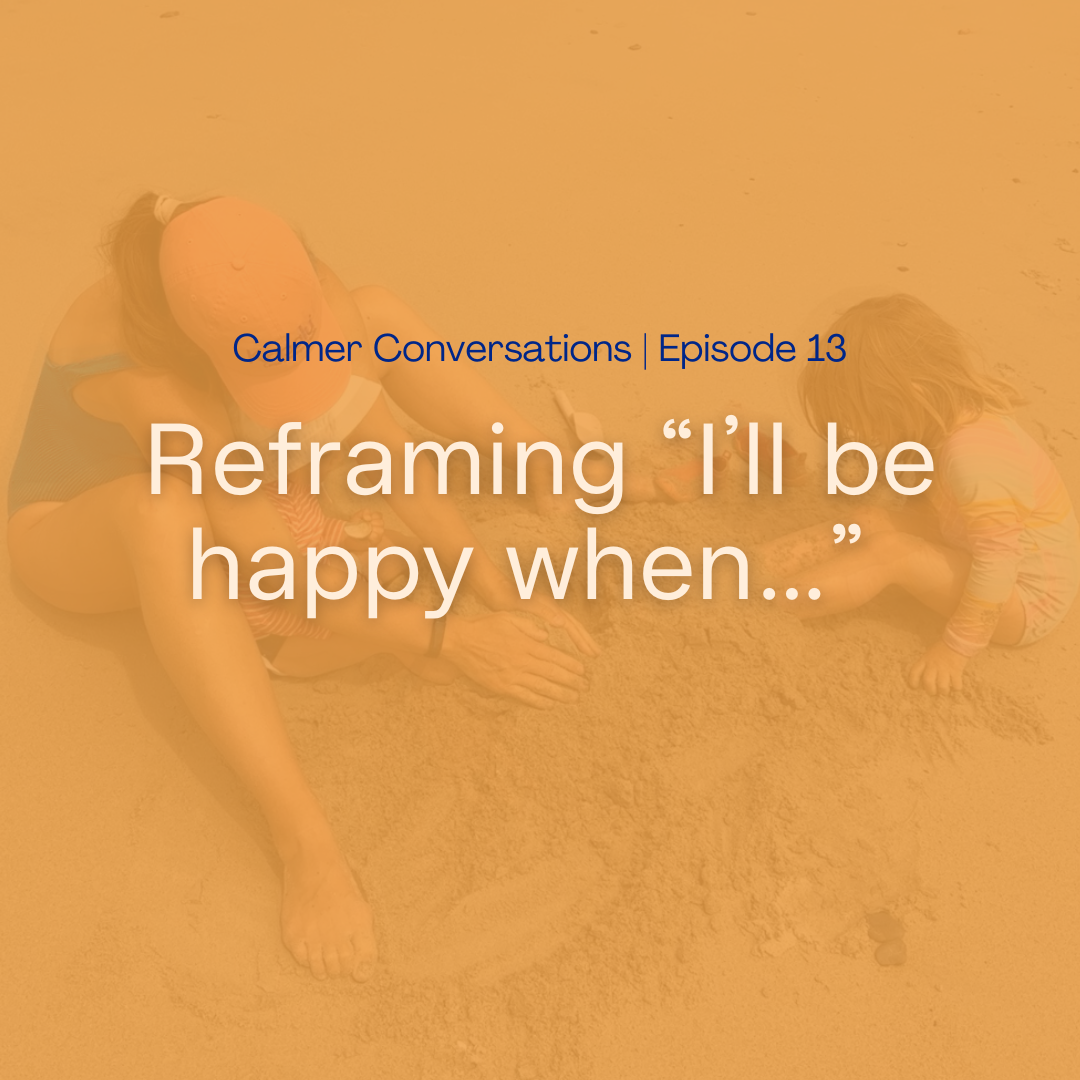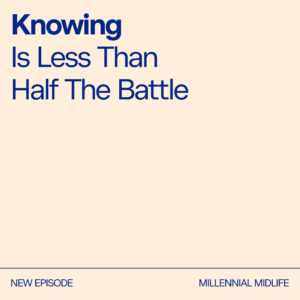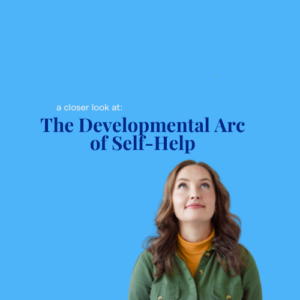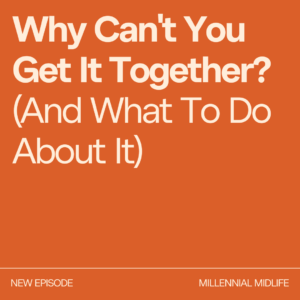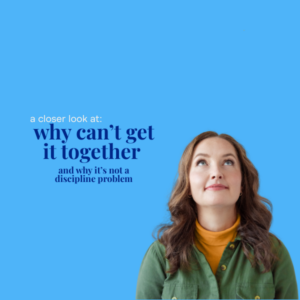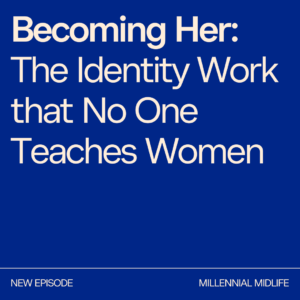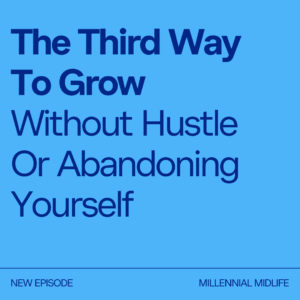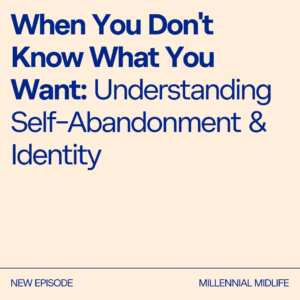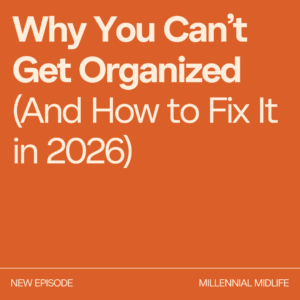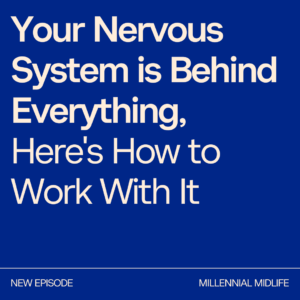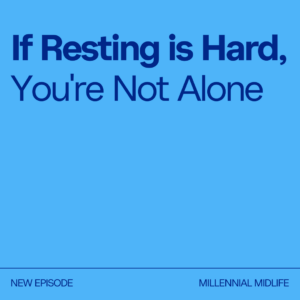Cecelia Baum Mandryk (00:01.496)
Hey, and welcome to Calmer Conversations, episode, believe 13. I’m Cecilia, your host. Let’s get started. So today we’re gonna play around with and answer the question, I will be happy when. And this is a question that often people have going through their heads or it’s a statement, I guess, rather than a question.
that goes through people’s heads that really drives a lot of what we do. And it does this really interesting thing where it puts happiness in the future. Plus, it makes something outside of you responsible for your happiness. So they’re all kind of important things. They’re all things that are tied to the coaching that I do and the approach that I take. And so I thought it would be a really kind of fun one to frame and also just a really interesting thing for you to fill out for yourself. So if you’re in a place where you can think about this, even if you’re driving,
or if you’re at a place where you have a pen and a piece of paper or recording device if you like to talk out loud to yourself or if you just want to think through it in any way, you might even pause this for a moment and brainstorm. Give yourself five minutes and fill in the blank, right? I will be happy when, and then write down as many things as you can think of. And if happiness isn’t the thing that you’re really striving for or the thing you feel like you’re struggling with,
most in life right now, then feel free to exchange happy for whatever else you want. So, I will feel successful when, I will feel calm when, I will feel less anxious when, I will feel loved when. So figure out what you want to be, that kind of, that operative word there. And again, different people will have different ones in their brains, but notice what it is for you.
Pause this if you can and think about it. Fill it out and really give yourself the opportunity to just brainstorm and write down whatever comes up. Because you’ll probably get some fun things like when I get that degree or when we remodel my kitchen or when I own a home. Plus you’ll get some really small ones like when my partner takes out the trash on time or when my kid picks up their socks or different things like that too, right? When the driver in front of me stops acting like they’re currently acting.
Cecelia Baum Mandryk (02:25.49)
So do that now if you’d like to, or if you don’t want to do it now, come back and do it because I think it’s, again, it’s really informative. And one of the things we just started, as I’m recording this, we just started the WINS course, this round of the WINS course a couple days ago. And I kind of uploaded a short video today for folks with the Cliff Notes for the first week. And one of the things that I really focused on in that video was the importance of our thoughts.
and how our thoughts really drive what we feel and what we do, how we feel and what we do. And our unintentional thoughts are very responsible for this. So right now, what you’re doing is you’re becoming aware of the unintentional thoughts that are going through your head that say, will be happy when. And these are all the things that your brain thinks are keeping you from happiness now.
Okay, so that list that you came up with or the list that you’re going to come up with, those are all the things your brain is saying, those are the reasons why you can’t feel happy now. And you might be saying, yes, of course, I can’t feel happy until these things happen. Like, obviously, that’s when happiness will come. Happiness will come at some point in the future when I’ve achieved these things. When I’ve checked these boxes, and when I’ve done all the things, then I will be happy. But as I said at the beginning, this is training your brain to think,
happiness is related to something outside of you and happiness is in the future and I want to talk about the happiness is in the future part first and then Talk more about happiness is dependent on something outside of you so your brain Which as you might start to gather and we’ll talk about this more in another episode, too There’s some distance between you and your brain or like the part of your brain that’s working day to day and the condition part of your brain
it has a kind of way of operating and you get to interact with it, right? So we, in all of this work, we’re kind of starting to create more separation there. Mindfulness does this, yoga does this, you get to be the gentle observer, you get to start to notice yourself more. So we are noticing, you are noticing when you do this, you’re noticing all the unintentional thoughts and you’re noticing how your brain is putting them in the future. And it’s saying that it’s training your brain, in fact, that happiness is something that will be achieved later on.
Cecelia Baum Mandryk (04:51.338)
it will be achieved in the future. But the interesting thing about the future is we never get there, right? Like in some ways we get to the place where we are tomorrow, right? So we will move forward in time, I guess, depending on what physicist you ask, if we are actually moving, if there is a space -time continuum or not. But at least in this reality, we are moving forward in time. But your brain still thinks the future is the future, right?
So the future is always the future. It never becomes the present in your brain. And so this shows up in the Declaration of Independence. If you’re in the US, the life, liberty and pursuit of happiness, right? So you have the right to pursue happiness. That doesn’t mean you have the right to be happy or feel happiness in this moment. And that’s an interesting societal and cultural kind of narrative that we pick up and that it’s something that you will achieve in the future.
And I remember this as a kid thinking that adulthood or kind of being content in life was a destination. It was someplace that I arrived where I would get there one day and then much like you get to your vacation destination, you like arrive at the hotel or wherever and you check in that you’re just there. You just kind of get to this place. And I believed at least that it was
that in order to get to this place, I needed to check a bunch of different boxes. I needed to go, I needed to graduate from high school, I needed to get into the right college, I needed to go to the right college, I needed to have the right kind of degree, I needed to get the right kind of job, I needed to have the right kind of house, I needed to have the right kind of relationship, I needed to decorate the right way for different holidays, I needed to like dress a certain way, needed to have a certain kind of car.
And the list could go on and on, right? So if you did take time to pause this and make your list of I will feel happy when, it could have been a very long one. You could probably spend a very long time or most people could spend a really long time filling that list out. It might not come the first time you do it because it’s maybe a question you’ve never actually asked yourself, but most of us have a pretty long list that says like, these are all the conditions that need to be met for me to be happy.
Cecelia Baum Mandryk (07:09.696)
And I do believe that at some point in the future, when I achieve all of them, I will be happy. But that’s just not the case. Because if you can think back to some place, some time in your past, you’ve thought, I will feel happy when I own a pair of Reebok high -top sneakers in white that I can wear to the first day of school. Right? That may have been one of mine at some point in the past. And I may or may not have gotten those. One year I didn’t, I think the next year I did.
And of course I felt some happiness when I first received them, right? This is the hedonistic happiness that we get, that immediate pleasure, the type one fun where we feel like that immediate little dopamine hit that we get when we open Instagram, where we get a like on something that we posted. But it did not bring me long -term eudaemonic happiness. I did not feel content because I now owned Reebok high -top sneakers and light that I could wear to school, right? This did not change.
my overall feeling of contentment and satisfaction and happiness in life. It did bring me a little bit of pleasure and joy in the moment, but that was not lasting. And most of the things that are on our list will somehow bring us some pleasure or joy in the moment, but they are not the thing that makes us happy or content or calm. And the reason that is, and this gets to the second point, is that those feelings don’t come from outside of us. So the feeling of happiness
the feeling of contentment, the feeling of joy does not come from something that happens outside of us, it comes from within us. And it comes from thoughts we have about what’s happening, and it comes from our actual state and our connection to ourself. And this is kind of trippy, I mean, it was hard from…
I mean, I can conceptually agree with that and I could conceptually agree with that for years, but I didn’t really totally understand it. And it’s such a big part of my work now that I work with it every day and I want to kind of explain it in my own way here, maybe in the hopes that it helps you get your brain wrapped around it a little sooner. So we as people, and because we’re in these societies where we are marketed to all the time,
Cecelia Baum Mandryk (09:30.082)
where people are trying to sell us things, where we see magazines and fitness things and we’re told when you are this size, you will be happy. When you have this thing, you will be happy. When you have this new thing, you will be happy. And the very nature of marketing and all of these pieces is that you have to always be getting new things, right? And so while you might feel happiness now with the Reebok high top sneakers, next year you need the pumps.
And then the year after that, need like the Nike Airs or whatever, right? And then the next year after that, you need something new, or maybe not even it’s a year, right? It’s like a half year. You need something new to make you happy. And this is saying, this is sending the signal to your brain, not only that happiness is in the future and you will get it when you achieve something or when you have something, but that it comes from someplace outside of you. That it comes from this external thing, that my happiness is related to my Reebok high -top sneakers.
rather than my happiness is related to my thoughts about my Reebok high -top sneakers, and in fact, my happiness is even more related to how I relate to myself and how I think about myself in the world and how I actually think of happiness in general. And this is where we start to move from chasing hedonic happiness. And I did say at some point at the beginning of this podcast that we dive into hedonic and eudaemonic happiness. And I guess we’re gonna do some of it today. But this is when we move.
So when you’re always chasing something outside of yourself, it’s more hedonic happiness, right? It’s more this happiness that is fleeting, that is momentary, the dopamine hit thing. And you get it then it goes away. And you get it it goes away. And you get it and it goes away. And you just keep chasing it. your brain is always kind of looking for that one next little bit of it, that one little bite to kind of satisfy it so that it can feel good so you can kind of move on with your day. And it’s always thinking it’s in the future. And these are ultimately not very satisfying because they don’t
bring you happiness, they don’t bring you contentment, they don’t bring you this long lasting equanimity and peacefulness that eudaemonic happiness is, this sense of purposefulness, this sense of being you and knowing yourself in the world. And so when we stop looking for happiness outside of ourselves, from that list that you made, right, and you start to create happiness inside now, and again, if happiness isn’t the word that you picked, please just
Cecelia Baum Mandryk (11:49.77)
Every time I say happiness, insert your other word, I’m just choosing one to go with. When you start to say that happiness comes from within me and it’s something I can create with my own thoughts about something and my own feelings, all of a sudden you are empowered in your life to create a different state of being and you suddenly have access to this deep, well…
of peace and well -being, of contentment, of joy that is always available to all of us, that we all have access to all the time, but that as long as we’re chasing happiness outside of ourselves, we don’t even know is there. Right? So you have to let go of the idea that happiness is outside of you to even become aware of this happiness that exists within you. And you have to say that, okay, I might still have goals,
and want to do things in life, right? Like I still 100 % have things I wanna achieve and I have things I wanna do and maybe even things I do have things I wanna have in life, but I no longer hitch my happiness to them. I no longer say I will be happy when I have this. I no longer say my happiness is predicated on getting this degree or having a certification or making this amount of money or any of those things. I can start to disconnect the two.
you can start to disconnect the two so that you can start to feel happiness no matter what you have or don’t have on that list, whatever you have achieved or haven’t achieved on that list, whether there are other people are or are not doing on that list. Happiness is always available to you. Peace is always available to you. Joy is always available to you. Contentment is always available to you. But it means separating yourself from those outside circumstances, from seeing the circumstances.
for what they are, which is neutral circumstances in the world, and then asking yourself how you want to engage with them, and what’s most important to you. And is it feeling good, is it feeling happy? And not this like, the dopamine hit happiness, but really this like, this less sexy, less fancy, frilly kind of contentment that does not mean you are complacent, and doesn’t mean that you’ve given up on dreams or achieving things.
Cecelia Baum Mandryk (14:12.226)
but means you said that I get to feel happy even if things aren’t going my way on the outside. I get to feel content in myself no matter what else is happening. And in fact, when I start to feel content to myself, I can truly see myself, I can accept myself, and then I can work with myself in new ways and I can shift and change in ways that are never available to me when I’m chasing something outside of me. So then everything becomes an inside game instead of an outside game.
Right, everything becomes how is this working within me? Does this story serve me? Does this way of looking at the world work with me? Or what is it even doing in my life? And if I can start to recognize that and be with it and accept whatever’s happening right now, whatever unintentional story I’m telling now, suddenly I have the power to change my story. I have the power to create however I wanna feel in the moment. And again, then that list that you made or will make, suddenly,
is not the thing that is determining your happiness. Okay, so I wanna go back to like the future thing for a moment too, because again, when you train your brain that happiness is in the future, what you end up doing is you just never will feel happy. Because like happiness is never something you can get, it’s always kind of in the future, even if you’re chasing these dopamine things, like the actual contentment and joy are never possible, right? It’s like something else outside of you. But when you say it’s possible now,
and it’s possible that I can create it now, then all of a sudden it becomes accessible to you. And when you start to say, my happiness is predicated on me and what’s happening in my brain and body, my nervous system, the stories I’m telling myself, that means that you have the power to create how you want to feel right now. So you get to look for ways, for instance, in which you already are successful and you can feel successful. And then the neat thing is,
you will be, you will go after goals from a different perspective and you will already feel the thing. So you’re not making them responsible for your happiness, but they get to kind of, they’re like cherries on top almost, right? They’re the things that they start to contribute to it, but they’re not responsible for it. So you no longer make things outside of you, circumstances, people, events, degrees, job titles.
Cecelia Baum Mandryk (16:36.648)
kitchen remodels, the kind of stove you have, you’re no longer making them responsible for your happiness. You are making yourself responsible for your happiness. You are taking responsibility for how you feel, which ultimately moves you back into the driver’s seat, gives you all the power, and starts to let you make more intentional choices that often are more aligned with you. Okay, there was a lot in this episode, and I think it’s, I mean, maybe we’ll unpack different parts of it in
I’m sure we will over the course of this podcast. But I really, think making that list of I will feel happy when is such an interesting thing to do because it will tell you so much about your unintentional thoughts. It will tell you so much about what’s happening in your brain that’s keeping you from feeling how you want to feel now. So noticing, I’m withholding feeling successful for myself right now until I get that promotion.
I’m withholding feeling joyous right now because I’m not pregnant or I don’t have a baby or I don’t have, I’m withholding feeling loved because I don’t have another person in my life. And the other interesting thing this does, it does when you haven’t done this, when you are making other people and circumstances responsible for how you feel, it puts a lot of pressure on them and it’s something they can’t,
you’re asking them to fulfill something they can’t actually do, which means you’re just setting yourself up for disappointment, generally, and pain and suffering. So when you’re asking something to come from outside of you instead of from inside of you, you don’t have access. You’re not empowered to create that feeling, essentially. And you’re also asking them to do something they can’t do, which is to make you feel a certain way, which they can’t actually do that. So how you feel comes from within you.
And if you wanna feel happy, successful, calm, et cetera, et cetera, et cetera, it is a matter of understanding your unintentional stories, a matter of working with your nervous system, which is what this podcast and what my work is all about so that you can feel how you want to feel. Okay, make that list, notice what’s on it, come say hi on Instagram or send me an email. I’ve got a new course coming up called Nervous System Self -Care where we’re gonna be diving into the bodily side of this. If you’re interested, we can have a link in the show notes and I will see you next time.

